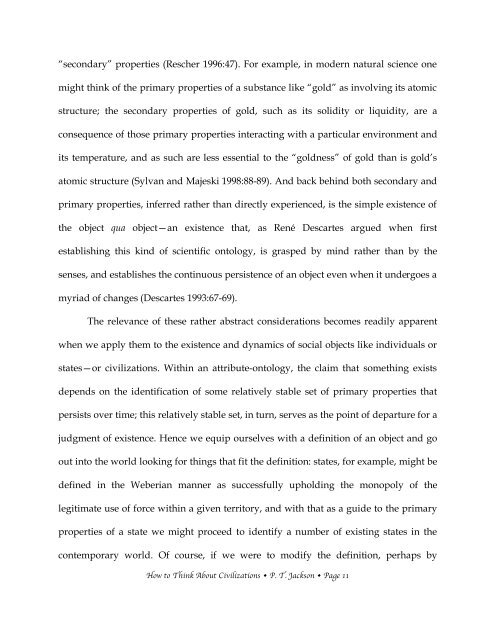How to Think About Civilizations - The Watson Institute for ...
How to Think About Civilizations - The Watson Institute for ...
How to Think About Civilizations - The Watson Institute for ...
You also want an ePaper? Increase the reach of your titles
YUMPU automatically turns print PDFs into web optimized ePapers that Google loves.
“secondary” properties (Rescher 1996:47). For example, in modern natural science one<br />
might think of the primary properties of a substance like “gold” as involving its a<strong>to</strong>mic<br />
structure; the secondary properties of gold, such as its solidity or liquidity, are a<br />
consequence of those primary properties interacting with a particular environment and<br />
its temperature, and as such are less essential <strong>to</strong> the “goldness” of gold than is gold’s<br />
a<strong>to</strong>mic structure (Sylvan and Majeski 1998:88-89). And back behind both secondary and<br />
primary properties, inferred rather than directly experienced, is the simple existence of<br />
the object qua object—an existence that, as René Descartes argued when first<br />
establishing this kind of scientific on<strong>to</strong>logy, is grasped by mind rather than by the<br />
senses, and establishes the continuous persistence of an object even when it undergoes a<br />
myriad of changes (Descartes 1993:67-69).<br />
<strong>The</strong> relevance of these rather abstract considerations becomes readily apparent<br />
when we apply them <strong>to</strong> the existence and dynamics of social objects like individuals or<br />
states—or civilizations. Within an attribute-on<strong>to</strong>logy, the claim that something exists<br />
depends on the identification of some relatively stable set of primary properties that<br />
persists over time; this relatively stable set, in turn, serves as the point of departure <strong>for</strong> a<br />
judgment of existence. Hence we equip ourselves with a definition of an object and go<br />
out in<strong>to</strong> the world looking <strong>for</strong> things that fit the definition: states, <strong>for</strong> example, might be<br />
defined in the Weberian manner as successfully upholding the monopoly of the<br />
legitimate use of <strong>for</strong>ce within a given terri<strong>to</strong>ry, and with that as a guide <strong>to</strong> the primary<br />
properties of a state we might proceed <strong>to</strong> identify a number of existing states in the<br />
contemporary world. Of course, if we were <strong>to</strong> modify the definition, perhaps by<br />
<strong>How</strong> <strong>to</strong> <strong>Think</strong> <strong>About</strong> <strong>Civilizations</strong> • P. T. Jackson • Page 11
















